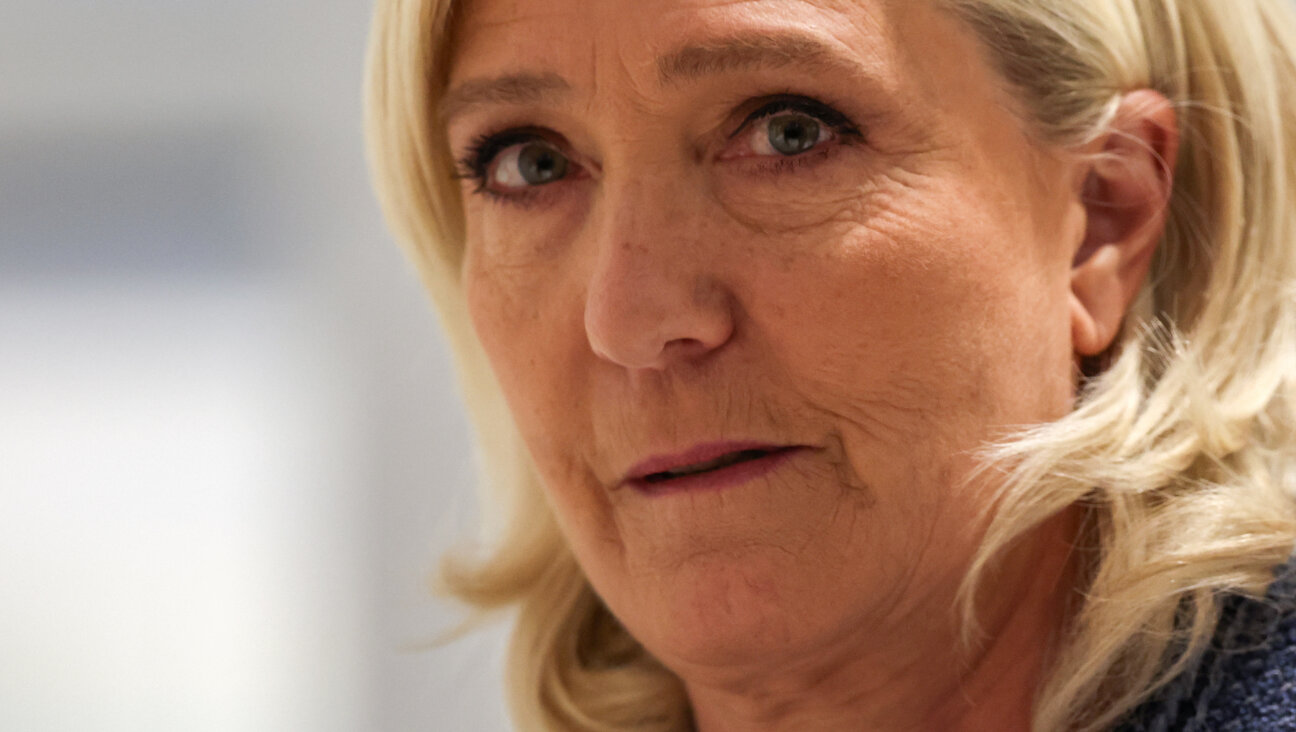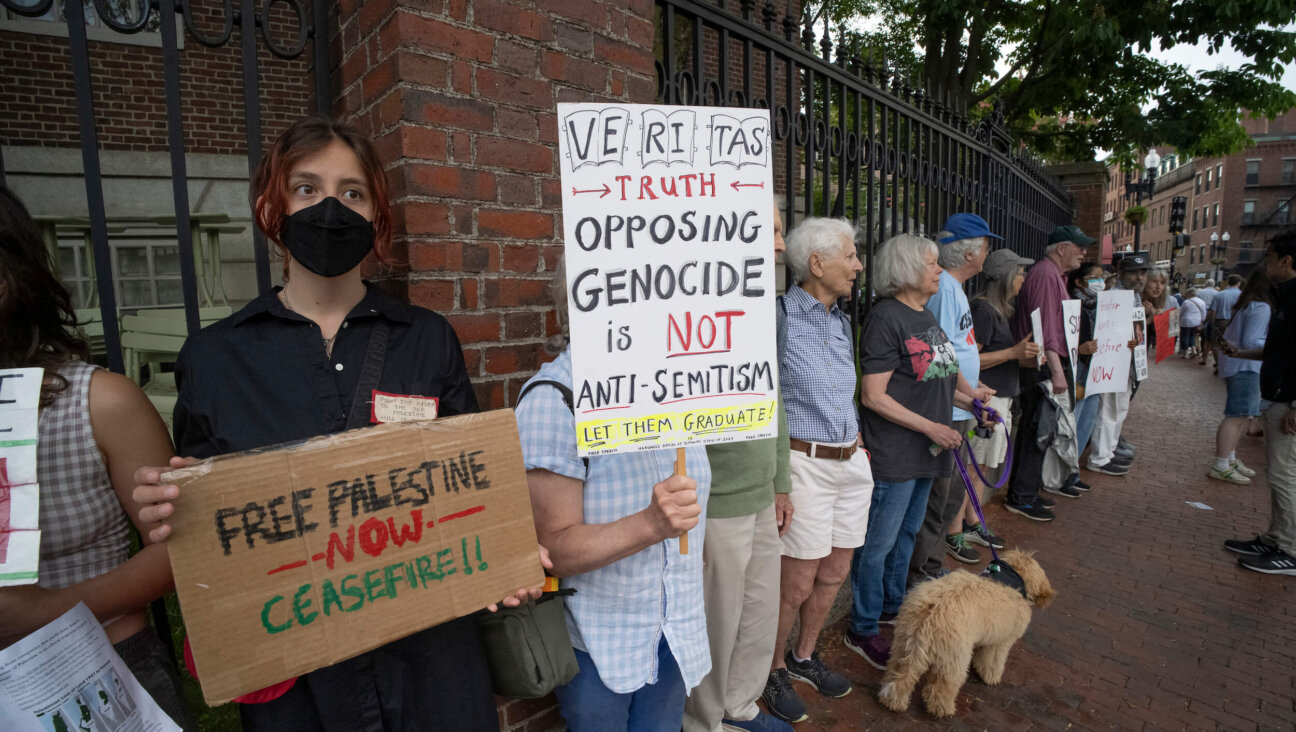Confront the Extremists in Our Midst
Why can’t American Jews call extremism by its name?
Over the last year, I have looked on in dismay as Israeli settlers who openly oppose our most cherished values as Americans and as Jews have been treated by Jewish organizational leadership and the Jewish press with attitudes ranging from polite silence to sympathetic understanding. Even worse has been the failure of much of our community to offer its clear support to an Israeli government that has confronted these fanatics with a firm hand, clearly articulating the dangers that they pose to the Zionist enterprise.
Not all Israeli settlers are fanatics, by any means. And no one denies the idealism that originally motivated them or the tragedy that is involved when a family is forced to leave its home. Nonetheless, a democratically elected government of Israel has determined that the security and well-being of the Jewish state require that settlements be removed from Gaza and the northern West Bank and that the inhabitants of these settlements be relocated. And the settler movement has responded in a way that undercuts the very foundation of Israel’s being, forfeiting in the process any claim that it may have on our sympathy.
Settler leaders have threatened civil war, called on religious soldiers to refuse orders by their commanders to evacuate settlements, proclaimed that rabbinic law — as interpreted by their rabbis — takes precedence over democratic decisions, and intimidated and ostracized Orthodox soldiers charged with carrying out the evacuations. At one point settlers began wearing orange stars, thus comparing themselves to Holocaust victims and Israel’s government to Nazi Germany; the practice was stopped almost immediately because of the revulsion it caused among average Israelis. The depth of the contempt for Israel’s elected leaders is reflected in the statement by settler spokesperson Daniella Weiss that Israeli “soldiers must refuse orders and turn a deaf ear to the directives of this evil government.”
In its publicity for a rally planned for January 30, the Yesha Council, the umbrella body of the settler movement, condemned the “minority government of Sharon, the left and the Arabs.” Apparently, the very presence of “leftists” in the Sharon government and the occasional support that it receives from Arab Knesset members are sufficient to disqualify the validity of its decisions. Only a decision by Jews — and not just any Jews, but right-wing and nationalist Jews — is legitimate in the Yesha Council’s eyes. While professing to support “democracy,” what it calls democracy bears no resemblance to any reasonable understanding of the term. Wasting no words, Prime Minister Sharon has again and again condemned the actions of the settlers as a threat to Israel’s democratic character.
Polling data, common sense and my own extensive travels tell me that American Jews overwhelmingly support the prime minister’s disengagement plan and reject the threatening, extremist rhetoric of the settlers. Why, then, have the settlers been given a free pass by the organized Jewish community here in the United States? And why has Sharon received such lukewarm support?
There are, I suggest, three factors that explain this phenomenon.
First, right-wing organizations and supporters of extremist settler groups are well organized and politically active, and conduct their own independent lobbying operations in Washington; furthermore, unlike others in the community, they do not hesitate to actively oppose positions of the government of Israel.
Thus, the Zionist Organization of America, despite its small size, has developed impressive political clout; Washington opinion makers and newspapers editors, both Jewish and non-Jewish, respond to its political contacts and steady stream of political statements, whether or not they are aware of its very modest grass-roots base. Centrist and left-leaning groups, on the other hand, are often less active politically, and are far more likely to function as part of broader communal coalitions that ultimately constrain what they can say and do.
Second, the Modern Orthodox movement in the United States, which is closer ideologically to the settlers than any other part of the community, has remained resolutely silent on settler extremism. Apart from a few rabbinic voices that have taken gentle exception to demands that Orthodox soldiers refuse orders to evacuate, the movement has chosen to say nothing about the ongoing stream of vitriol and incitement issued by settler leaders.
My Modern Orthodox friends suggest that the situation is complicated in their community; some identify completely with the settlers, while many have reservations. Still, the dramatic turn to the right taken by the religious Zionist camp in Israel in recent years and the close ties between the two communities make it unlikely that any American Modern Orthodox leader, no matter how troubled, will voice public criticism.
Third, the centrist, moderate, non-Orthodox segments of the American Jewish community, which constitute the overwhelming majority, have been silenced by a long-standing and increasingly bizarre adherence to communal organizational norms. Most of these groups operate as part of communal coalitions because of their commitment to the desirability of “unity” and “consensus” among Jewish groups. But in fact, “unity” and “consensus” are defined in such a way that small, outspoken minorities are given a veto over positions that are shared by a substantial majority of American Jews.
The Jewish Council for Public Affairs, the public policy arm of the federation system, is not immune to this way of thinking. But the worst offender is the Conference of Presidents of Major American Jewish Organizations, which sees itself as the central address for the organized Jewish community in America.
The leadership of the Presidents Conference recently proclaimed its intention to send a message of support for the Israeli government to the Israeli and American public, as if this were a new idea and as if generating such support has not always been the purpose of the conference. Yet nearly a year after Sharon announced his plan for disengagement from Gaza, the Presidents Conference still has not issued a clear, unequivocal statement of support for that plan.
Recently, instead of spending its time organizing public declarations of backing for the government, it chose to give a forum to hired-gun demographers engaged by right wingers to undermine disengagement. Under the circumstances, if tomorrow the settlers were to call for open rebellion against Israel’s government, the Presidents Conference could not be counted on to condemn such sentiments.
Settler extremism is a disgrace to the Jewish community and to the principles of Torah that we hold dear. Courageous leaders in Israel’s government have spoken out against the dangers of the extremists, and American Jews expect their leaders to do the same. Failure to do so undermines both our authority and the credibility of the religious tradition in whose name we speak.
What we would like to see, of course, is real reform of our communal bodies. But lacking this, Jewish organizations need to set aside those self-imposed organizational constraints that were intended to strengthen our community’s voice but instead have served to stifle debate and silence the voice of the majority. We need to speak up individually and in ad hoc coalitions in support of Israel’s elected government and the democratic principles that it champions. We need to reject extremism in all forms, and champion the cause of realism and moderation that alone can inspire our community and ensure the future of Israel.
Rabbi Eric Yoffie is president of the Union for Reform Judaism.
The Forward is free to read, but it isn’t free to produce

I hope you appreciated this article. Before you go, I’d like to ask you to please support the Forward.
At a time when other newsrooms are closing or cutting back, the Forward has removed its paywall and invested additional resources to report on the ground from Israel and around the U.S. on the impact of the war, rising antisemitism and polarized discourse.
Readers like you make it all possible. We’ve started our Passover Fundraising Drive, and we need 1,800 readers like you to step up to support the Forward by April 21. Members of the Forward board are even matching the first 1,000 gifts, up to $70,000.
This is a great time to support independent Jewish journalism, because every dollar goes twice as far.
— Rachel Fishman Feddersen, Publisher and CEO
2X match on all Passover gifts!
Most Popular
- 1

News A Jewish Republican and Muslim Democrat are suddenly in a tight race for a special seat in Congress
- 2

Fast Forward The NCAA men’s Final Four has 3 Jewish coaches
- 3

Film & TV What Gal Gadot has said about the Israeli-Palestinian conflict
- 4

Fast Forward Cory Booker proclaims, ‘Hineni’ — I am here — 19 hours into anti-Trump Senate speech
In Case You Missed It
-

News Who would protect New York Jews better? Cuomo and Lander trade attacks on the campaign trail
-
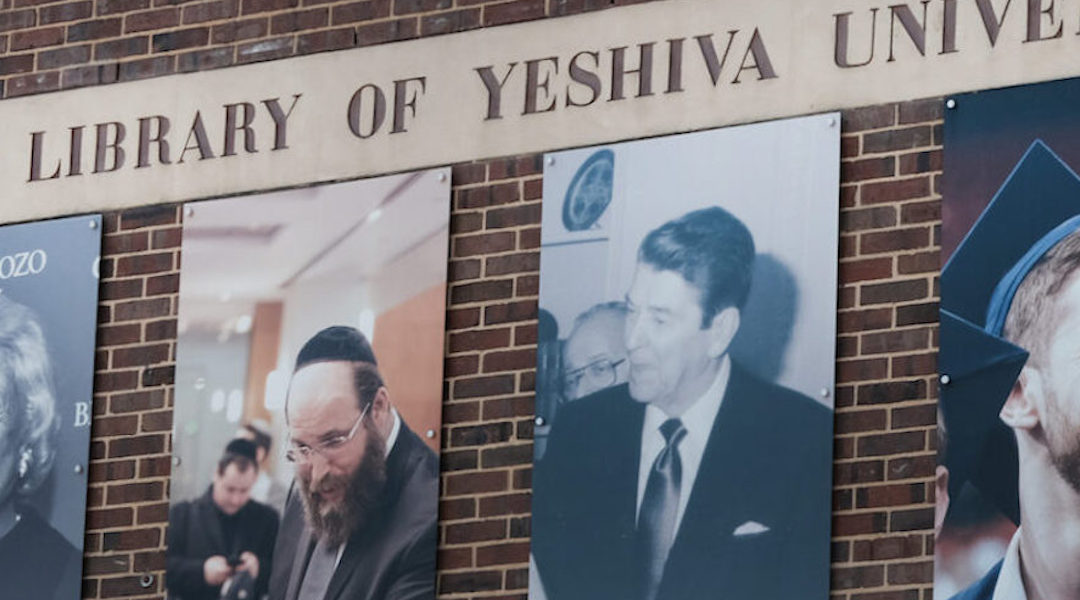
News Rabbis revolt over LGBTQ+ club, exposing fight over queer acceptance at Yeshiva University
-
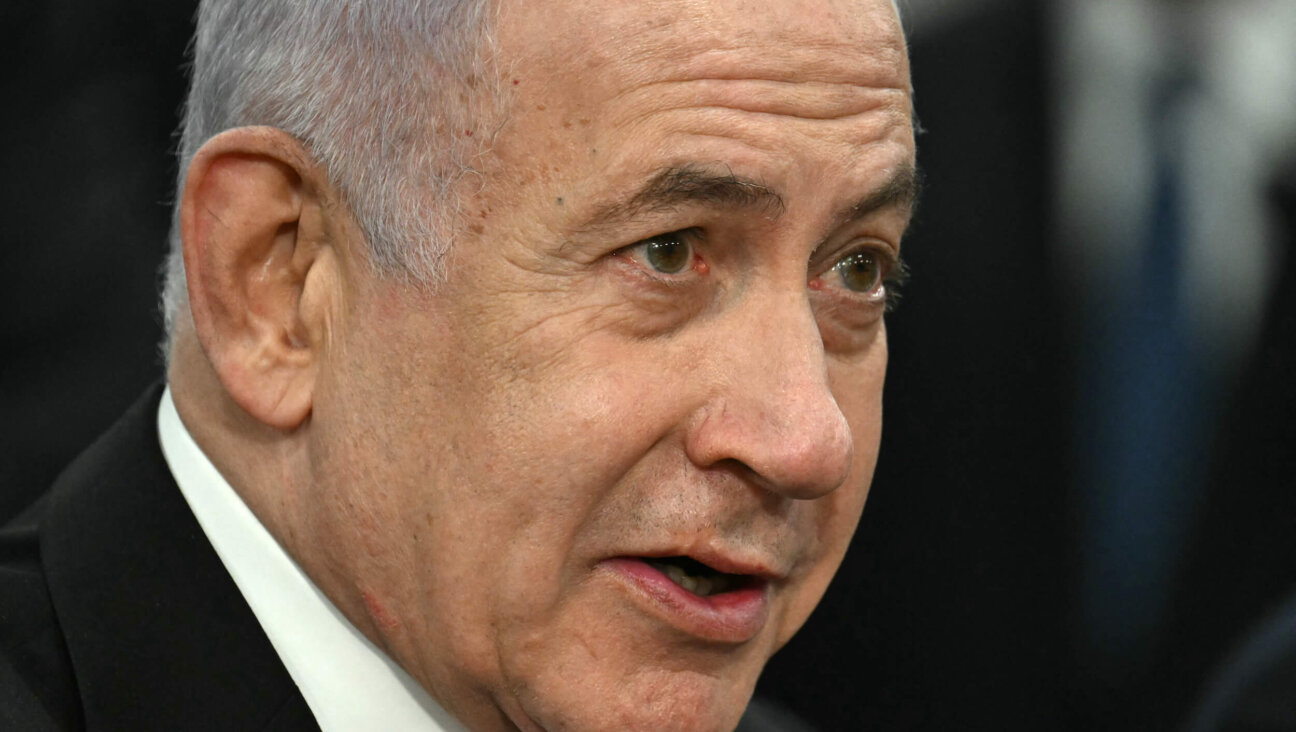
Opinion In Qatargate fiasco, Netanyahu’s ‘witch hunt’ narrative takes cues from Trump
-
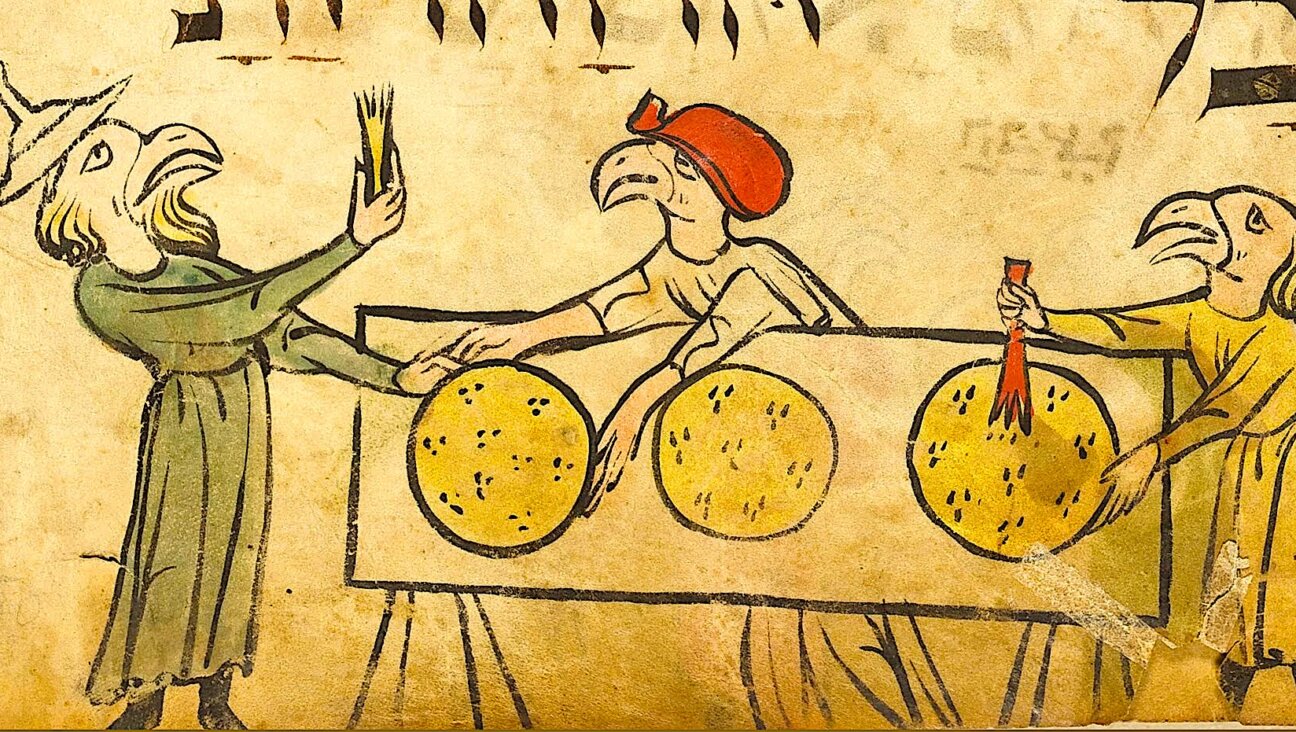
Yiddish די הגדה ווי אַ לעבעדיקער דענקמאָל פֿון אַשכּנזישער פּאָעזיעThe Haggadah as a living monument to Ashkenazi poetry
אַמאָל זענען די פּייטנים, מיסטישע דיכטער־וויזיאָנערן, געווען אויבן־אָן בײַ די פֿראַנצויזישע און דײַטשישע ייִדן.
-
Shop the Forward Store
100% of profits support our journalism
Republish This Story
Please read before republishing
We’re happy to make this story available to republish for free, unless it originated with JTA, Haaretz or another publication (as indicated on the article) and as long as you follow our guidelines.
You must comply with the following:
- Credit the Forward
- Retain our pixel
- Preserve our canonical link in Google search
- Add a noindex tag in Google search
See our full guidelines for more information, and this guide for detail about canonical URLs.
To republish, copy the HTML by clicking on the yellow button to the right; it includes our tracking pixel, all paragraph styles and hyperlinks, the author byline and credit to the Forward. It does not include images; to avoid copyright violations, you must add them manually, following our guidelines. Please email us at [email protected], subject line “republish,” with any questions or to let us know what stories you’re picking up.







